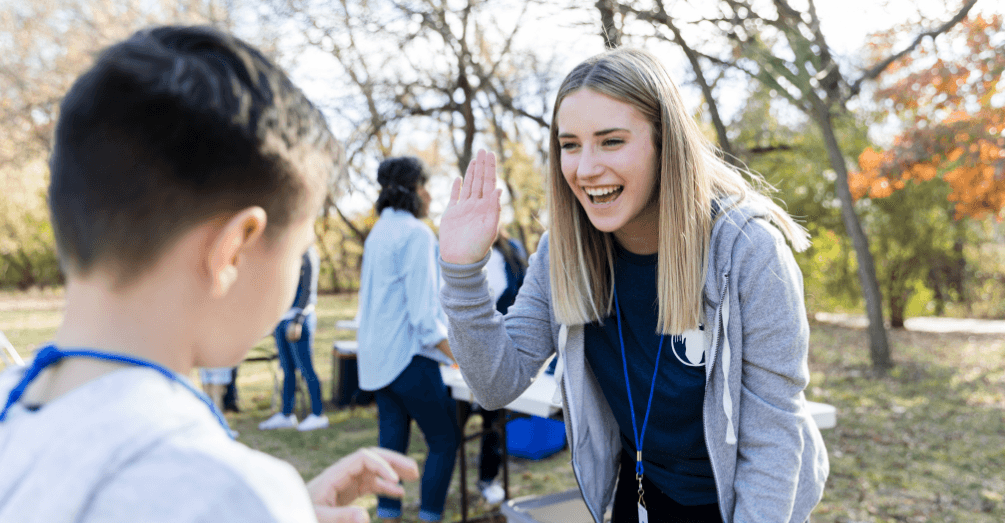Helping Yourself by Helping Others: The Benefits of Volunteering

It is no secret that volunteering makes us feel good. Doing something for others is a sure-fire way to make a contribution to the world we live in, especially when you’re away from your home country and want to get more involved with the local community. Recent studies show that volunteering may be just as beneficial for the volunteer as for the person benefiting from the volunteer’s charitable acts, even going so far as to have a significant impact on their longevity, life satisfaction, and psychological well-being.
Volunteering, the brain and your body
“Helping others activates the reward center in your brain” explains Dr. Susan Albers, a psychologist at The Cleveland Clinic. This releases serotonin, dopamine, and endorphins—all chemicals that make you happy. This explains the instant gratification that volunteers may experience. The good feeling that comes with ‘doing good’ isn't just your imagination, it is based in science!
A research team from the University of British Columbia measured the effect of charitable acts on a group of older participants with high blood pressure. Participants who used as little as forty dollars to buy things for others instead of themselves significantly decreased their blood pressure, as compared with participants who spent money on themselves. The decrease in their blood pressure was as significant as that seen with high-frequency exercise or a healthier diet. Researchers who studied the effect of volunteering on cholesterol and blood glucose levels observed similar results.
The benefits of volunteering defy the limits of age
While students or young professionals often view high cholesterol and blood pressure as ailments exclusive to those of a more advanced age, the health benefits of volunteering apply to younger generations as well. A 2013 study found that high school students who volunteered had better markers for heart disease than those who did not. In addition, volunteering has been linked to lower levels of cognitive impairment, along with higher levels of employment, work performance, and personal development in life.
Although participation in volunteer work has been seen to increase with age (the older generations often have more free time to engage in volunteer activities), studies show that volunteering at any age can have a positive impact on your overall life satisfaction and psychological well-being. Individuals who begin volunteering regularly from a young age, even as little as a few hours a month, can benefit from the positive health effects linked to making a contribution to their community.
 Volunteering and your well-being
Volunteering and your well-being
The case for the benefits volunteering can have on your physical health is strong, but it is also great for your mental health. Susan Albers of The Cleveland Clinic explains that volunteering “has been shown to decrease stress levels, depression, anxiety and boost your overall health and satisfaction with life.” In recent years, researchers have taken particular interest in studying exactly how volunteering can benefit your psychological well-being, leading them to discover that volunteering contributes to mental health in a variety of ways.
Volunteering sparks happiness
Many studies have demonstrated that helping others sparks feelings of happiness. One such study from the London School of Economics found that the more people volunteered, the happier they reported being. Similarly, a 2022 study found that volunteers felt an increased feeling of “mattering” or feeling that they were an active and valued part of the world around them.
Helping others and the community allows volunteers to feel a sense of accomplishment or purpose in their life. Donating their time and energy can become a big part of the volunteer’s personal identity, or a part of their life that they take pride in. Individuals who possess high levels of self-esteem and life-satisfaction are less at risk of suffering from stress, anxiety, and even depression.
Connecting to others through volunteering
In recent years, the detrimental health effects of loneliness have sparked interest among researchers and led them to study the link between loneliness and declining physical, mental, and emotional well-being.
A lesser-known benefit of volunteering is its ability to connect volunteers with others in their community who may share the same values or interests. One study found that by giving volunteers the opportunity to interact with others, volunteering increased their connectedness and social integration, which in turn decreased their levels of loneliness.
Students or young professionals living abroad often face the challenge of feeling lonely in their new environment. As an expat, it can be hard to feel integrated in a community when cultural differences, language barriers, and the difficulty of finding new friends stand in your way.
Volunteering is a great way to connect with your community and feel like you are a part of a group instead of a foreigner observing it from afar. Meeting other volunteers can also be an easy way to form lasting social connections, develop new language skills, and feel like you are a part of the community you now call home.
Even if you feel you have integrated well into your host community, inviting a friend who may be struggling with culture shock or homesickness can be a great way to help each other while also helping your community! For those of us who may not be naturally outgoing, volunteering is an opportunity to meet others in a judgment-free and friendly environment. When people share common interests or are working towards a common goal, friendships naturally arise.
New to volunteering? Or not sure where to start while abroad?
Here are 3 quick tips to help you get started:
- Follow your passions
The easiest way to start volunteering is to find an organization with a mission you are passionate about. Do you love sports? Volunteer as a coach for a youth sports team. Do you knit in your free time? Try starting a knitting social group at a retirement community.
Or take the opposite approach and try something new!
Volunteering can also be a great way to find new interests or gain new skills. You don't have to be an expert in something to make a contribution. Learn about food insecurity or problems faced by refugees by volunteering at an NGO. Or maybe you want to learn more about animals. You can donate your time to a local animal shelter.
Reach out and jump in!
Once you identify what you are passionate about, what skills you have to offer or a new area you want to learn about, the next step is to reach out to an organization and start volunteering! The internet can be a great place to start, but don't forget about resources like the IE Center for Health and Well-being too!
